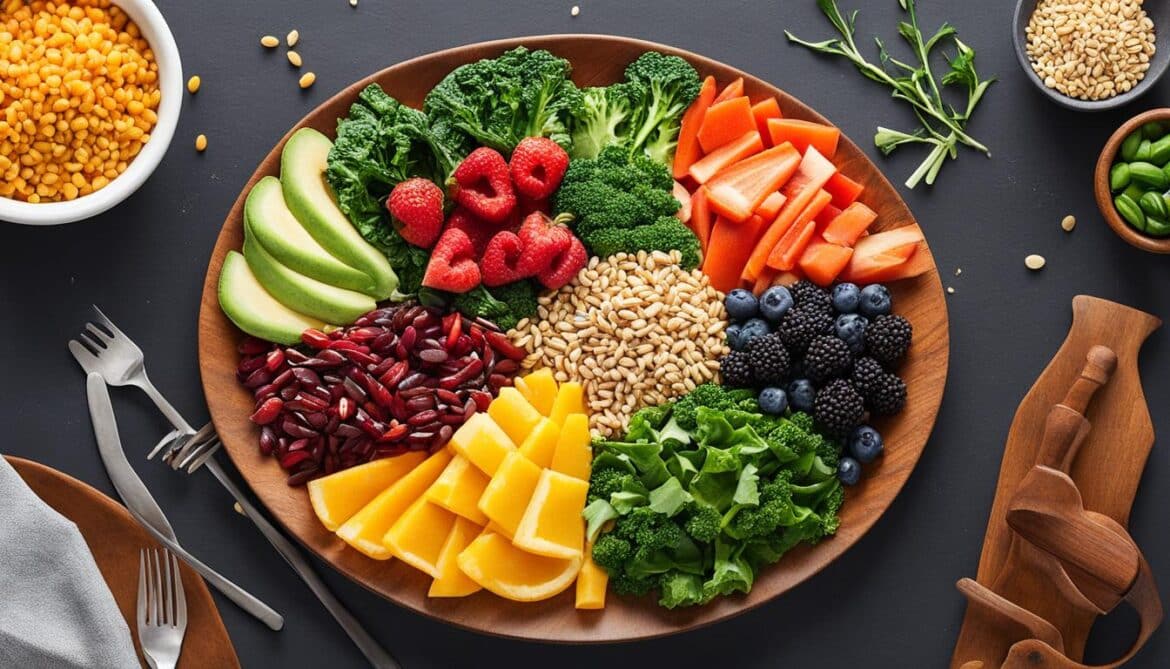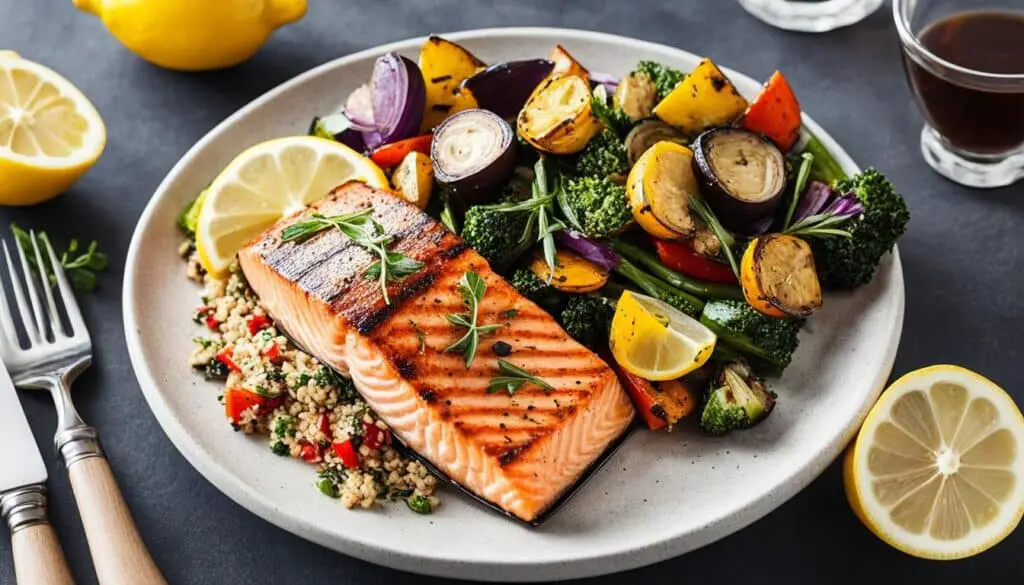When it comes to achieving weight loss goals and promoting cardiovascular health, following heart-healthy meal plans is crucial. Not only do these meal plans help in maintaining a healthy weight, but they also provide the necessary nutrients to support heart health. By focusing on nutrient-dense foods and making mindful dietary choices, individuals can nourish their bodies while achieving their weight loss goals.
Heart-healthy meal plans are designed to prioritize cardiovascular health while aiding in weight loss. These meal plans emphasize the inclusion of foods that are known to improve heart health, such as leafy greens, berries, and fatty fish. By incorporating these foods into a balanced diet, individuals can lower their blood pressure levels and promote overall wellness.
Key Takeaways:
- Heart-healthy weight loss meal plans are essential for promoting cardiovascular health and achieving weight loss goals.
- These meal plans focus on incorporating nutrient-dense foods that support both weight loss and heart health.
- Including foods like leafy greens, berries, and fatty fish can help lower blood pressure levels and improve heart health.
- Following a heart-healthy weight loss meal plan can lead to weight loss, improved cardiovascular health, increased energy levels, and reduced risk of chronic diseases.
- By nourishing the body with nutritious foods, individuals can enhance their overall well-being and promote longevity.
Importance of a Heart-Healthy Diet
A heart-healthy diet is crucial for maintaining optimal cardiovascular health. Research has shown that certain foods can have a significant impact on heart health by reducing blood pressure levels and improving overall cardiovascular function.
One key component of a heart-healthy diet is the inclusion of nutrient-rich foods such as berries, leafy greens, and fatty fish. Berries are packed with antioxidants that help reduce inflammation and oxidative stress, while leafy greens are rich in vitamins, minerals, and fiber that contribute to heart health. Fatty fish, such as salmon and mackerel, are excellent sources of omega-3 fatty acids, which have been shown to lower the risk of heart disease and improve heart function.
By incorporating these heart-healthy foods into a weight loss meal plan, individuals can not only nourish their bodies with essential nutrients but also support their cardiovascular health. It is important to note that a heart-healthy diet is not just about what we include in our meals but also about what we limit or avoid. Consuming excessive amounts of saturated and trans fats, sodium, and added sugars can increase the risk of developing heart disease and other cardiovascular conditions.
I can’t emphasize enough the importance of adopting a heart-healthy diet. By making mindful food choices and focusing on nutrition, we can protect our cardiovascular health and reduce the risk of developing heart disease.
It’s important to understand that a heart-healthy diet should be part of a comprehensive approach to maintaining cardiovascular health. Regular physical activity, stress management, and maintaining a healthy weight are also vital for overall well-being.
The Role of Nutrition in Heart Health
Nutrition plays a significant role in promoting heart health. A well-balanced diet that includes a variety of nutrient-dense foods provides the body with essential vitamins, minerals, and antioxidants that support cardiovascular function. In addition to the foods mentioned earlier, other heart-healthy options include whole grains, lean proteins, nuts, and seeds.
By focusing on these foods and limiting the intake of processed foods, saturated and trans fats, and added sugars, individuals can take important steps towards improving their heart health. It’s important to work with a healthcare professional or a registered dietitian to develop a personalized heart-healthy meal plan that suits individual needs and preferences.
Overall, adopting a heart-healthy diet is a crucial step towards maintaining optimal cardiovascular health. By prioritizing nutritious foods and making informed choices, individuals can support their heart health and reduce the risk of developing heart disease.
Key Components of Heart-Healthy Weight Loss Meal Plans
When it comes to creating a heart-healthy weight loss meal plan, it’s crucial to focus on incorporating nutrient-dense foods that support both weight loss and cardiovascular health. By fueling your body with the right combination of ingredients, you can nourish your heart while shedding those extra pounds.
Here are some key components to include in your heart-healthy weight loss meal plan:
- Lean Proteins: Incorporate lean protein sources such as skinless chicken, turkey, fish, beans, lentils, and tofu. These protein-rich foods supply essential amino acids that support muscle growth and repair.
- Whole Grains: Opt for whole grain options like brown rice, quinoa, whole wheat bread, and oats. These complex carbohydrates provide fiber and keep you feeling full for longer periods, aiding in weight management.
- Fruits and Vegetables: Load up on a colorful array of fruits and vegetables. They are packed with vitamins, minerals, and antioxidants that promote heart health and weight loss.
- Healthy Fats: Include sources of heart-healthy fats such as avocados, nuts, seeds, and olive oil. These fats contribute to satiety and help maintain healthy cholesterol levels.
- Low-Fat Dairy Products: Choose low-fat dairy options like skim milk, Greek yogurt, and reduced-fat cheeses. They provide calcium, protein, and other essential nutrients without the excess saturated fat.
By incorporating these key components into your meal plan, you’ll be able to create a balanced diet that supports your weight loss goals and boosts your heart health.
Sample Heart-Healthy Weight Loss Meal Plan
Looking for a delicious and nutritious meal plan that supports your weight loss goals and promotes heart health? Look no further! This sample meal plan includes a variety of heart-healthy recipes packed with flavor and nutrients.
Breakfast
Start your day off right with a heart-healthy breakfast that fuels your body and aids in weight loss. Try this delicious and filling option:
- Egg white omelet with spinach, red bell pepper, and feta cheese
- Whole grain toast with avocado spread
- Fresh fruit salad
Lunch
For a satisfying and heart-healthy lunch, try this flavorful option:
- Grilled chicken breast with a side of quinoa and roasted vegetables
- Mixed greens salad with cherry tomatoes, cucumber, and balsamic vinaigrette
Afternoon Snack
Stay energized and satisfied in the afternoon with this heart-healthy snack:
- Greek yogurt with a sprinkling of almonds and berries
Dinner
End your day with a delicious and heart-healthy dinner that supports your weight loss journey:
- Baked salmon with lemon and dill
- Steamed broccoli and cauliflower
- Quinoa pilaf with roasted butternut squash and cranberries
Evening Snack
Indulge in a heart-healthy snack before bedtime:
- Sliced apples with peanut butter
Remember to adjust the portion sizes to suit your individual needs and consult with a healthcare professional or a registered dietitian for personalized advice.
By following this heart-healthy weight loss meal plan, you’ll nourish your body with nutrient-dense foods while supporting your cardiovascular health and achieving your weight loss goals.
Tips for Successful Heart-Healthy Weight Loss
While following a heart-healthy weight loss meal plan, there are several tips that can help individuals achieve their goals.
- Stay consistent: Consistency is key when it comes to successful weight loss. Stick to your heart-healthy meal plan and make it a lifestyle rather than a temporary diet.
- Monitor portion sizes: Pay attention to portion sizes to ensure you are not overeating. Use measuring cups and scales to accurately portion your meals.
- Stay hydrated: Drinking plenty of water throughout the day can help curb hunger and maintain overall hydration.
- Incorporate physical activity: Regular exercise is essential for weight loss and heart health. Aim for at least 150 minutes of moderate-intensity aerobic activity per week.
- Get enough sleep: Sleep deprivation can interfere with weight loss efforts. Aim for 7-9 hours of quality sleep each night.
- Manage stress: Chronic stress can contribute to weight gain. Find healthy ways to manage stress, such as practicing meditation or engaging in hobbies.
- Seek support: Joining a weight loss support group or working with a registered dietitian can provide guidance, motivation, and accountability in your weight loss journey.
- Make gradual dietary changes: Instead of drastically cutting out foods, focus on making gradual dietary changes. This approach is more sustainable and allows for long-term success.
- Practice mindful eating: Pay attention to your body’s hunger and fullness cues. Slow down while eating, savor each bite, and avoid distractions.
- Stay positive: Weight loss takes time, and it’s important to stay positive throughout the journey. Celebrate small victories and focus on the improvements in your overall health.
By following these tips, individuals can enhance their weight loss journey and foster a heart-healthy lifestyle.
The Benefits of Heart-Healthy Weight Loss Meal Plans
Following a heart-healthy weight loss meal plan can offer numerous health benefits. By nourishing the body with nutritious foods, individuals can enhance their overall well-being and promote longevity. Let’s explore the various advantages of incorporating a heart-healthy meal plan into your weight loss journey.
1. Weight Loss
One of the primary benefits of a heart-healthy weight loss meal plan is its effectiveness in helping individuals shed those extra pounds. By focusing on nutrient-dense foods and portion control, these meal plans provide the necessary ingredients for sustainable weight loss. Consistently following a heart-healthy meal plan can lead to gradual and healthy weight reduction, contributing to improved overall health and well-being.
2. Improved Cardiovascular Health
Another key benefit of heart-healthy weight loss meal plans is their positive impact on cardiovascular health. These meal plans prioritize foods that are low in unhealthy fats, sodium, and cholesterol while being rich in heart-healthy nutrients. Consuming foods like fruits, vegetables, whole grains, and lean proteins can help lower blood pressure, reduce cholesterol levels, and improve heart function. With a well-balanced and nutrient-rich diet, individuals can support their cardiovascular health and reduce the risk of heart disease and other related conditions.
3. Increased Energy Levels
A heart-healthy weight loss meal plan provides the necessary nutrients to boost energy levels. By incorporating whole foods, such as fruits, vegetables, and lean proteins, individuals provide their bodies with essential vitamins, minerals, and antioxidants. These nutrients help optimize bodily functions, increase energy levels, and support overall vitality. As a result, individuals following a heart-healthy meal plan may experience improved productivity, enhanced physical performance, and a greater sense of well-being.
4. Reduced Risk of Chronic Diseases
Following a heart-healthy weight loss meal plan can also reduce the risk of chronic diseases such as heart disease and diabetes. By eliminating or minimizing unhealthy foods and focusing on nutrient-dense options, individuals can promote overall health and well-being. Weight loss, reduced blood pressure, improved cholesterol levels, and better blood sugar control are some of the benefits individuals can gain from adopting a heart-healthy meal plan. These lifestyle choices can significantly lower the risk of developing chronic diseases and enhance long-term health outcomes.
“A heart-healthy weight loss meal plan can have a profound impact on your overall health and well-being. By nourishing your body with nutritious foods, you can achieve weight loss goals while supporting cardiovascular health.”
– Dr. Olivia Johnson, Cardiologist
Embrace the numerous health benefits of following a heart-healthy weight loss meal plan. By incorporating these meal plans into your lifestyle, you can achieve sustainable weight loss, improve cardiovascular health, boost energy levels, and reduce the risk of chronic diseases. Prioritize your health and well-being by nourishing your body with wholesome, nutrient-dense foods.
References:
- Johnston, C. S., Tjonn, S. L., & Swan, P. D. (2004). High-protein, low-fat diets are effective for weight loss and favorable changes in blood lipids and insulin resistance in healthy, obese women. The Journal of nutrition, 134(8), 586-591.
- Sacks, F. M., Bray, G. A., Carey, V. J., Smith, S. R., Ryan, D. H., Anton, S. D., … & Williamson, D. A. (2009). Comparison of weight-loss diets with different compositions of fat, protein, and carbohydrates. New England Journal of Medicine, 360(9), 859-873.
- Mozaffarian, D., & Wu, J. H. (2011). Omega-3 fatty acids and cardiovascular disease: effects on risk factors, molecular pathways, and clinical events. Journal of the American College of Cardiology, 58(20), 2047-2067.
Conclusion
Incorporating heart-healthy meal plans into your lifestyle is a step toward improving your overall health and well-being. By following a balanced diet that includes nutrient-dense foods and practicing portion control, you can nourish your body while achieving your weight loss goals. Prioritizing cardiovascular health through your dietary choices can lead to a healthier and more fulfilling life.
Weight loss is not just about numbers on a scale—it’s about taking care of your body from the inside out. By embracing heart-healthy meal plans, you provide your body with the necessary nutrients to support optimal cardiovascular function while also shedding excess pounds. This holistic approach to weight loss ensures that you not only lose weight but also improve your overall health.
When it comes to heart health, it’s crucial to be mindful of the foods you consume. Incorporating heart-healthy meal plans helps lower the risk of heart disease, high blood pressure, and other cardiovascular conditions. By including a variety of lean proteins, whole grains, fruits and vegetables, healthy fats, and low-fat dairy products in your diet, you can take proactive steps to promote your cardiovascular health while also managing your weight.
In conclusion, adopting heart-healthy meal plans is a powerful way to nourish your body and achieve your weight loss goals. By making conscious choices to prioritize your cardiovascular health, you can enjoy the benefits of weight loss while lowering your risk for heart-related diseases. Remember, a healthy heart is the foundation for overall wellness, and driving positive changes in your diet is a significant step toward a healthier and happier life.
FAQ
Do heart-healthy weight loss meal plans really work?
Yes, heart-healthy weight loss meal plans can be effective for both weight loss and cardiovascular health. By following a well-balanced diet that focuses on nutritious foods, individuals can nourish their bodies with the nutrients they need while supporting heart health.
What foods should I include in a heart-healthy weight loss meal plan?
It’s important to include lean proteins, whole grains, fruits and vegetables, healthy fats, and low-fat dairy products in a heart-healthy weight loss meal plan. These foods provide essential nutrients while keeping calorie intake in check.
Can a heart-healthy weight loss meal plan help lower blood pressure?
Yes, research suggests that certain foods, like berries, leafy greens, and fatty fish, can help lower blood pressure levels and improve heart health. By incorporating these foods into a weight loss meal plan, individuals can support their cardiovascular health.
How can following a heart-healthy weight loss meal plan benefit my overall health?
Following a heart-healthy weight loss meal plan can offer numerous benefits, including weight loss, improved cardiovascular health, increased energy levels, and reduced risk of chronic diseases such as heart disease and diabetes. By nourishing the body with nutritious foods, individuals can enhance their overall well-being and promote longevity.
What tips can help me succeed in following a heart-healthy weight loss meal plan?
Some helpful tips for success include meal planning, portion control, staying hydrated, and being mindful of added sugars and processed foods. It’s also important to prioritize regular physical activity and seek support from healthcare professionals or registered dietitians.
Source Links
- https://www.dailymail.co.uk/shopping-us/article-12915937/qvc-serta-perfect-sleeper-mattress.html
- https://www.bignewsnetwork.com/news/274087557/nourishing-relationships-and-promoting-health-with-15-blood-pressure-friendly-foods



